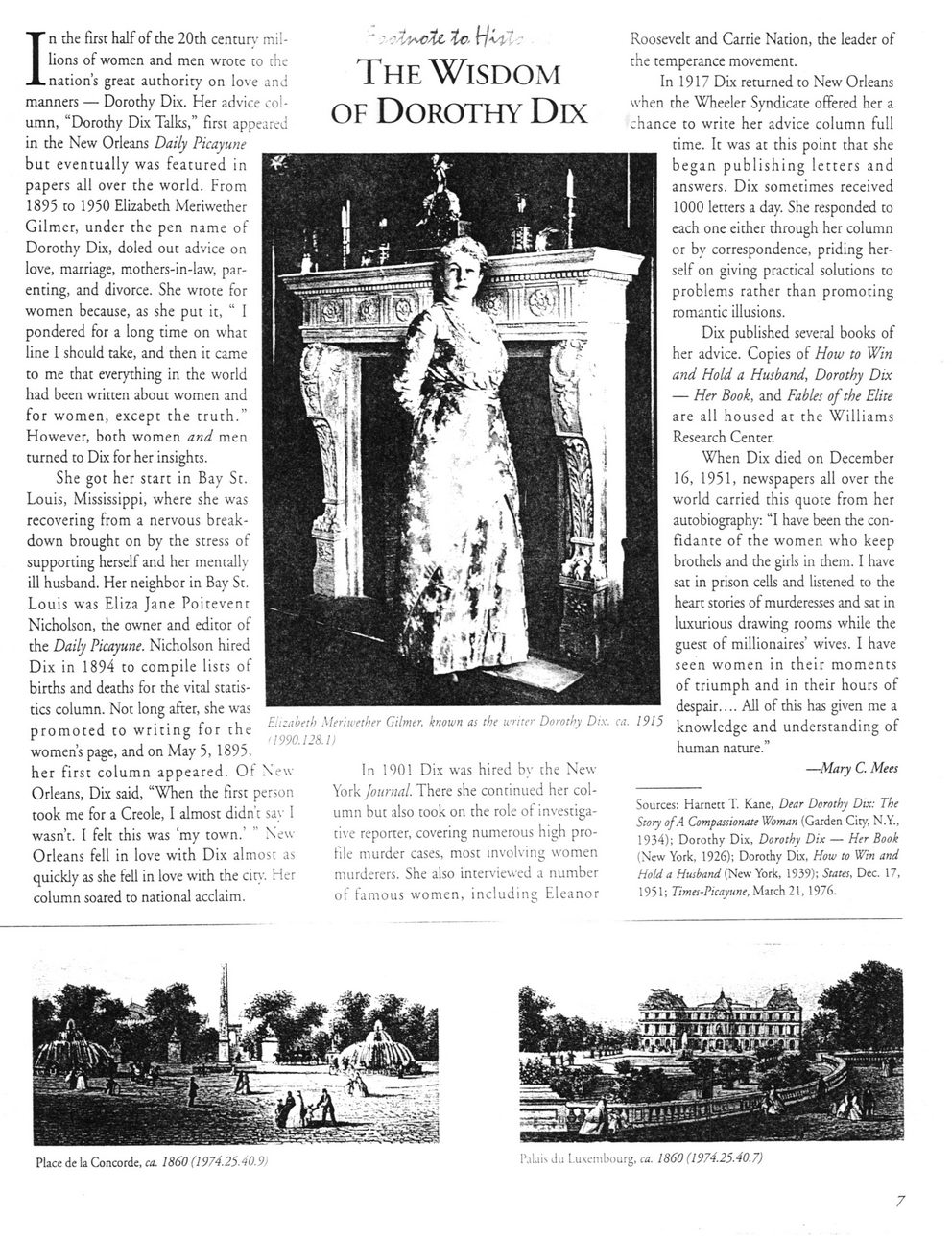This text was obtained via automated optical character recognition.
It has not been edited and may therefore contain several errors.
In the first half of the 20th centurv millions of women and men wrote to the nation?s great authority on love and manners ? Dorothy Dix. Her advice column, ?Dorothy Dix Talks,? first appeared in the New Orleans Daily Picayune but eventually was featured in papers all over the world. From 1895 to 1950 Elizabeth Meriwether Gilmer, under the pen name of Dorothy Dix, doled out advice on love, marriage, mothers-in-law, parenting, and divorce. She wrote for women because, as she put it, ? I pondered for a long time on what line I should take, and then it came to me that everything in the world had been written about women and for women, except the truth.? However, both women and men turned to Dix for her insights. She got her start in Bay St. Louis, Mississippi, where she was recovering from a nervous breakdown brought on by the stress of supporting herself and her mentally ill husband. Her neighbor in Bay St. Louis was Eliza Jane Poitevent Nicholson, the owner and editor of the Daily Picayune. Nicholson hired Dix in 1894 to compile lists of births and deaths for the vital statistics column. Not long after, she was promoted to writing for the women?s page, and on May 5, 1895, her first column appeared. Ot New Orleans, Dix said, ?When the first person took me for a Creole, I almost didn t say 1 wasn?t. I felt this was ?my town.? ? New Orleans fell in love with Dix almost as quickly as she fell in love with the city. Her column soared to national acclaim. " tc- r The Wisdom of Dorothy Dix In 1901 Dix was hired by the New York Journal. There she continued her column but also took on the role of investigative reporter, covering numerous high profile murder cases, most involving women murderers. She also interviewed a number of famous women, including Eleanor Roosevelt and Carrie Nation, the leader of the temperance movement. In 1917 Dix returned to New Orleans when the Wheeler Syndicate offered her a chance to write her advice column full time. It was at this point that she began publishing letters and answers. Dix sometimes received 1000 letters a day. She responded to each one either through her column or by correspondence, priding herself on giving practical solutions to problems rather than promoting romantic illusions. Dix published several books of her advice. Copies of How to Win and Hold a Husband, Dorothy Dix ? Her Book, and Fables of the Elite are all housed at the Williams Research Center. When Dix died on December 16, 1951, newspapers all over the world carried this quote from her autobiography: ?I have been the confidante of the women who keep brothels and the girls in them. I have sat in prison cells and listened to the heart stories of murderesses and sat in luxurious drawing rooms while the guest of millionaires? wives. I have seen women in their moments of triumph and in their hours of despair.... All of this has given me a knowledge and understanding of human nature.? ?Mary C. Mees Sources: Harnett T. Kane, Dear Dorothy Dix: The Story of A Compassionate Woman (Garden City, N.Y., 1934); Dorothy Dix, Dorothy Dix ? Her Book (New York, 1926); Dorothy Dix, How to Win and Hold a Husband (New York, 1939); States, Dec. 17, 1951; Times-Picayune, March 21, 1976. Elizabeth Meriwether Gilmer, known as the writer Dorothy Dix. ca. 1915 1990.128.1) Place de la Concorde, ca. I860 (1974.25.40.9) Mai' Ju Luxembourg, ca. 1860 (1974.25.40.7) 7

Dix, Dorothy 005